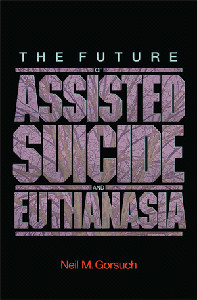Euthanasia is the practice of intentionally ending life to eliminate pain and suffering.

Assisted suicide means a procedure in which people take medications to end their own lives with the help of others, usually medical professionals. The term usually refers to physician-assisted suicide (PAS), which is an end of life measure for a person suffering a painful, terminal illness. Once it is determined that the person's situation qualifies under the physician-assisted suicide laws for that location, the physician's assistance is usually limited to writing a prescription for a lethal dose of drugs.
The right to die is a concept based on the opinion that human beings are entitled to end their life or undergo voluntary euthanasia. Possession of the right to die is often bestowed with the understanding that a person with a terminal illness, incurable pain, or without the will to continue living should be allowed to end their own life, use assisted suicide, or decline life-prolonging treatment. The question of who, if anyone, may be empowered to make this decision is often the subject of debate.
Decriminalization or decriminalisation is the legislative process which removes prosecutions against an action so that the action remains illegal but has no criminal penalties or at most some civil fine. This reform is sometimes applied retroactively but otherwise comes into force from either the enactment of the law or from a specified date. In some cases regulated permits or fines may still apply, and associated aspects of the original criminalized act may remain or become specifically classified as crimes. The term was coined by anthropologist Jennifer James to express sex workers' movements' "goals of removing laws used to target prostitutes", although it is now commonly applied to drug policies. The reverse process is criminalization.
Voluntary euthanasia is the ending of a person's life at their request in order to relieve them of suffering. Voluntary euthanasia and physician-assisted suicide (PAS) have been the focus of intense debate in recent years. Some forms of voluntary euthanasia are legal in Australia, Belgium, Canada, Colombia, Luxembourg, the Netherlands, New Zealand, and Spain.
Opposing Viewpoints is a series of books on current issues which seeks to explore the varying opinions in a balanced pros/cons debate. The series attempts to encourage critical thinking and issue awareness by providing opposing views on contentious issues. The online versions are managed by Cengage Gale and the print versions are available through Rosen publishing.

James Webster Rachels was an American philosopher who specialized in ethics and animal rights.
Terrorism: Opposing Viewpoints is a book, in the Opposing Viewpoints series, presenting selections of contrasting viewpoints on four central questions about terrorism: whether it is a serious threat; what motivates it; whether it can be justified; and how the United States should respond to it. It was edited by Laura K. Egendorf.
The Death Penalty: Opposing Viewpoints is a book in the Opposing Viewpoints series. It presents selections of contrasting viewpoints on the death penalty: first surveying centuries of debate on it; then questioning whether it is just; whether it is an effective deterrent; and whether it is applied fairly. It was edited by Mary E. Williams.

Sexual Violence: Opposing Viewpoints is a 2003 book edited by Helen Cothran. It presents selections of contrasting viewpoints on four central questions about sexual violence: what causes it; whether it is a serious problem; how society should address it; and how it can be reduced. The book is part of the Opposing Viewpoints series.
The World Federation of Right to Die Societies is an international federation of associations that promote access to voluntary euthanasia. It holds regular international meetings on dying and death.

Ezekiel Jonathan "Zeke" Emanuel is an American oncologist, bioethicist and senior fellow at the Center for American Progress. He is the current Vice Provost for Global Initiatives at the University of Pennsylvania and chair of the Department of Medical Ethics and Health Policy. Previously, Emanuel served as the Diane and Robert Levy University Professor at Penn. He holds a joint appointment at the University of Pennsylvania School of Medicine and the Wharton School and was formerly an associate professor at the Harvard Medical School until 1998 when he joined the National Institutes of Health.
Involuntary euthanasia is illegal in all 50 states of the United States. Assisted suicide is legal in 10 jurisdictions in the US: Washington, D.C. and the states of California, Colorado, Oregon, Vermont, New Mexico, Maine, New Jersey, Hawaii, and Washington. The status of assisted suicide is disputed in Montana, though currently authorized per the Montana Supreme Court's ruling in Baxter v. Montana that "nothing in Montana Supreme Court precedent or Montana statutes [indicates] that physician aid in dying is against public policy."
Katherine K. Young is a Canadian religious studies professor at McGill University. Originally a scholar of Hinduism, in later life her interests have turned to the topic of misandry.
Helga Kuhse is an Australian utilitarian philosopher and bioethicist.
Child euthanasia is a form of euthanasia that is applied to children who are gravely ill or have significant birth defects. In 2005, the Netherlands became the first country since the end of Nazi Germany to decriminalize euthanasia for infants with hopeless prognosis and intractable pain. Nine years later, Belgium amended its 2002 Euthanasia Act to extend the rights of euthanasia to minors. Like euthanasia, there is world-wide public controversy and ethical debate over the moral, philosophical and religious issues of child euthanasia.

Jean's Way, a book by Derek Humphry, is an account of Humphry's terminally ill wife's planned suicide from suffering. The book is his first on the issue of voluntary euthanasia and assisted suicide.
Involuntary euthanasia, typically regarded as a type of murder, occurs when euthanasia is performed on a person who would be able to provide informed consent, but does not, either because they do not want to die, or because they were not asked.

The Future of Assisted Suicide and Euthanasia is a 2006 book by Neil Gorsuch. The book presents legal and moral arguments against euthanasia and assisted suicide, advocating for the retention of bans on the practices. It explores case histories from jurisdictions that have legalized the practice, including Oregon and the Netherlands. The Future of Assisted Suicide and Euthanasia grew out of Gorsuch's doctoral dissertation. While attending Oxford University, he studied legal and ethical issues related to assisted suicide and euthanasia under John Finnis, an Australian legal scholar opposed to assisted suicide.
The Christian Liberty Party (CLP) is a minor third political party in the United States whose platform advocates social conservatism. Its platform positions include the opposition to abortion, as well as opposition to property taxes; it advocates "an educational system that respects individual freedom of conscience and reinforces the Biblical role and responsibility of the family as the educator of youth". Ideologically, the Christian Liberty Party is aligned with the Christian right and Christian nationalism, viewing the United States as a Christian state and seeing "the Bible as a blueprint for political action".






